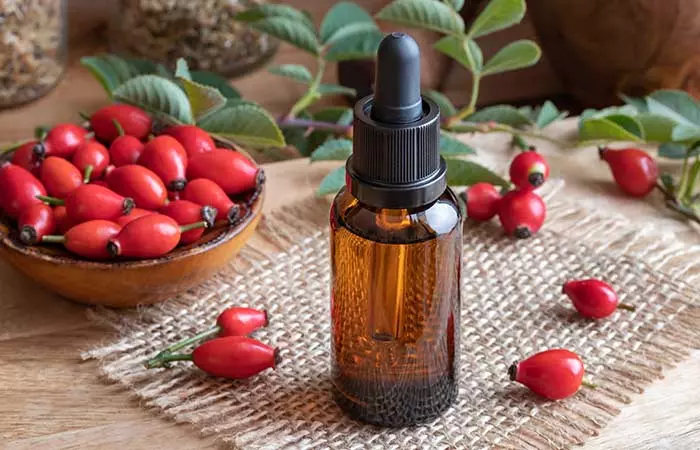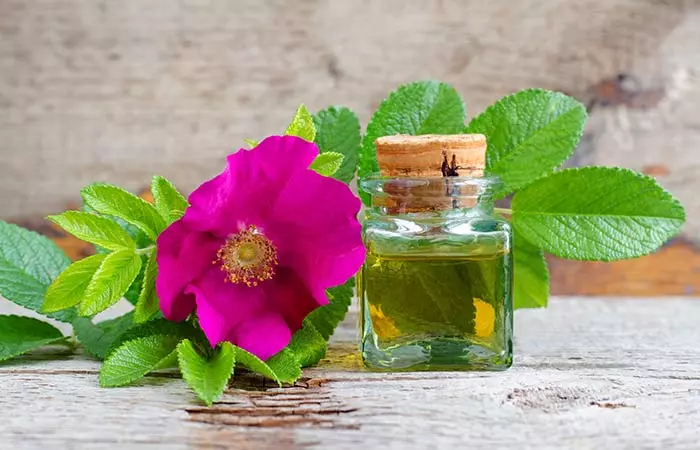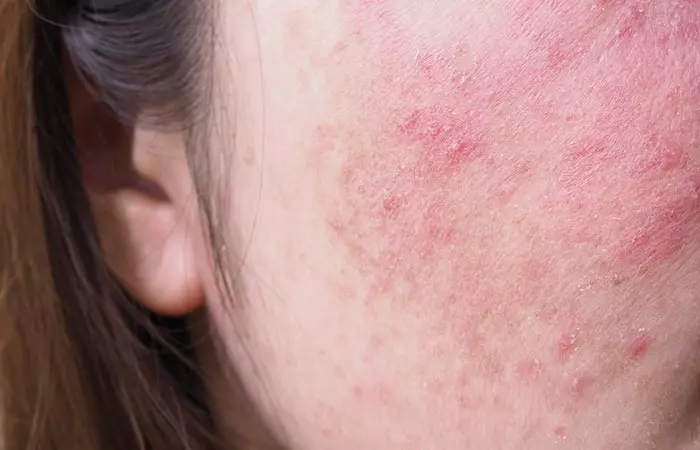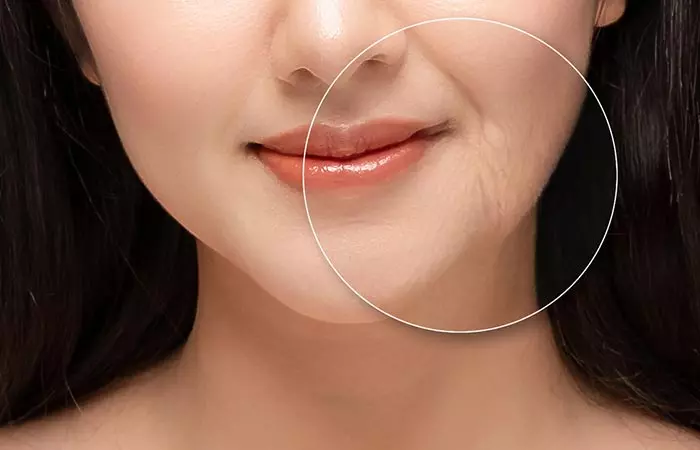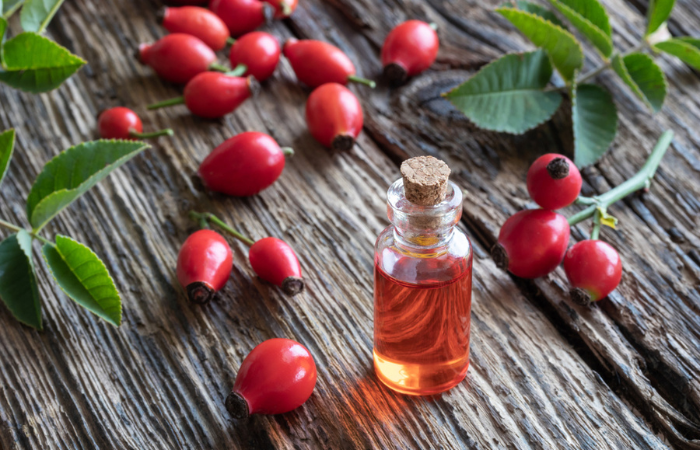The reason? The plenty of anti-aging benefits it offers for the skin, such as reducing fine lines and soothing the skin. So, have you included rosehip face serum in your daily skincare routine? If not, do it at the earliest to achieve flawless skin. In this article, we have listed the benefits of rosehip seed oil, easy homemade beauty recipes to prepare face serum, its potential side effects, and many more. So, let us get started!
DIY Rosehip Face Serum Recipes
Note: Before you use rosehip seed oil, don’t forget to do a patch test to avoid skin reactions or side effects (explained later in the article). Once you are sure that your skin can tolerate rosehip seed oil, you can start using it. There are many ways to incorporate this wonder oil into your natural skincare routine. While you can buy commercially available rosehip face serums sold by various skincare brands, there’s nothing better than DIY and natural serums containing organic ingredients and botanicals. Check out the recipes below.
1. Rosehip And Jojoba Oil Face Serum
Jojoba oil is extremely beneficial in healing compromised skin and repairing the skin barrier. It can treat multiple skin issues, such as acne, eczemai A chronic skin condition that causes dryness and itchiness, impairs the skin barrier function, and flares up from time to time. , and dermatitisi A collective term for various skin irritations that are characterized by inflammation, itchiness, redness, dryness, and rashes. (1).
9 teaspoons of rosehip seed oil 12 teaspoons of jojoba oil 12 drops of essential oil of your choice 1 dark glass bottle with a dropper
2. Rosehip And Carrot seed Oil Serum
Carrot seed oil has skin rejuvenating properties. It scavenges harmful free radicals and keeps your skin feeling fresh and rejuvenated (2).
8 drops of rosehip seed oil 2-3 drops of carrot seed oil
3. Rosehip And Aloe Vera Night Serum
Aloe vera contains salicylic acid (heals acne), antioxidants, such as vitamins C and E, and minerals. It reduces skin inflammation and promotes wound healing (3).
1 aloe vera leaf 20-25 drops of rosehip seed oil
4. Rosehip and Pomegranate Seed Oil
Pomegranate seed oil is loaded with antioxidants that improve the transepidermal absorption rate of your skin (4). In other words, it helps your skin absorb other products better.
10-15 drops of rosehip seed oil 2-3 drops of pomegranate seed oil
These were a few ways you could incorporate rosehip seed oil in your daily skin care routine. But before you use the oil, take a look at the reasons your skin is going to love it.
Why Use Rosehip Face Serum? Benefits Of Rosehip Seed Oil
Rosehip seed oil is the primary ingredient in rosehip face serums. Rosehips are the round parts that you see below the rose flower. These are pseudo-fruits of the plants of the Rosa genus of the Rosaceai A skin condition characterized by visible blood vessels, redness, and pimples (small, often pus-filled) bumps on the face. family. These pseudo-fruits from different species of roses are widely used for medicinal purposes as they contain high levels of bioactive compounds and antioxidants (5).
1. It Hydrates Your Skin
Rosehip seed oil contains linoleic acid and high levels of polyunsaturated fatty acids (5). Linoleic acid is the most abundant fatty acid in the skin, and it plays an essential role in maintaining the epidermal barrier or the skin’s natural barrier. It prevents trans-epidermal water loss and maintains the hydration levels of the stratum corneum, the outermost layer of the skin (6).
2. It Has Anti-Inflammatory Properties
Rosehips are rich in vitamins B, C, and E and also contain carotenoids and polyphenols that help reduce inflammation (5). Rosehip seed oil may help calm your skin if you have inflammatory conditions, such as eczemai A chronic skin condition that causes dryness and itchiness, impairs the skin barrier function, and flares up from time to time. , dermatitisi A collective term for various skin irritations that are characterized by inflammation, itchiness, redness, dryness, and rashes. , and rosaceai A skin condition characterized by visible blood vessels, redness, and pimples (small, often pus-filled) bumps on the face. .
3. It Prevents UV Damage
Rosehips are rich in vitamin C that protects the skin from UV damage. Long-term sun exposure can cause erythemai Widespread or localized redness of the skin due to sunburn and excess friction that is not caused by an underlying illness. and sunburn. Topical vitamin C has a UV protective effect on your skin. It also neutralizes the harmful free radicals (7).
4. It Prevents Collagen Damage
Collagen is a protein that naturally occurs in your cells. UV exposure can damage the skin collagen and speed up the aging process. It may cause signs of photoaging, such as wrinkles, fine lines, and hyperpigmentation. Since rosehips are loaded with vitamin C, they help prevent collagen damage and keep your skin youthful (7).
5. It Improves The Appearance Of Scars
A study found that rosehip seed oil could promote tissue regeneration and prevent post-surgical scars. The participants in the study saw significant improvement in the appearance of the scars after 6-12 weeks (8). Moreover, you may also use rosehip oil for acne as a preventive measure, which may help prevent acne inflammation and the risk of subsequent scarring. Maria, a blogger, made a DIY face serum with rosemary oil. She says, “I’ve found that using this anti-aging serum twice a day yields the best results. I incorporate it into my morning and evening skincare routine, and on days when I don’t wear makeup, I let my skin soak in its goodness throughout the day (i).” We could, of course, keep talking about all the benefits of rosehip oil, but it is also wise to touch up on the side effects of overuse. Let’s read about those below.
Rosehip Seed Oil: Are There Any Side Effects?
The most common side effect of using rosehip seed oil is an allergic reaction. If you are allergic to rosehip seed oil or vitamin C, you may experience the following allergic reactions:
Itchiness Skin rashes Hives Itchy and watery eyes Anaphylaxisi A potentially fatal allergic reaction that can develop within seconds or minutes of being exposed to an allergen. Breathing trouble Dizziness Wheezing Rapid heart rate
As we mentioned earlier, rosehip seed oil contains vitamin C. Many people are allergic to it. Researchers are not clear if the topical application of rosehip seed oil affects the body’s levels of vitamin C. Increased levels of vitamin C in the body affect people with conditions like hemochromatosisi A genetic disorder that can increase the risk of cancer and cause abnormal heart rate and liver damage due to excess iron in the body. and anemia (9). Hence, it is better to do a patch test. Also, consult a doctor before using rosehip seed oil to avoid its interaction with any medications you may be taking. If you are someone who does not want to make rosehip face serum, you can also use the oil in other ways. Read on to learn how to use this facial oil.
Other Ways To Use Rosehip Facial Oil
You can incorporate rosehip oil into your daily skin care routine in the following way: Can I use Vitamin C serum and rosehip serum together? You can also use rosehip oil directly on your face. However, make sure to use only cold-pressed, 100% organic, and pure, therapeutic-grade oil. This plant-based serum can improve your skin texture and help minimize signs of aging. Don’t forget to do a patch test before using it for holistic skincare. If you wish to incorporate both ingredients into your skin care routine, applying each formula at different times of the day is preferable. This is the most convenient technique to allow the skin to develop a tolerance to new ingredients while avoiding irritation and allergies. For example, apply your vitamin C serum first thing in the morning and rosehip oil later in the evening to renew your skin as you catch up on your restful sleep. Is rosehip face serum a retinol? No, retinol battles the signs of aging, whereas rosehip oil, which is high in vitamin C, brightens the face. Rosehip oil and retinol, on the other hand, are said to work well together. Retinol, combined with rosehip oil, works wonders when it comes to aging or sensitive skin. They work together to rejuvenate, moisturize, and tone your skin. Is rosehip face serum good for dry, sensitive skin? Yes, rosehip face serum is usually considered good for dry, sensitive skin and all other skin types. However, you must always perform a patch test before adding it to your skincare regime to avoid any allergies. Does rosehip face serum make skin more sensitive to the sun? Yes, anecdotal evidence suggests that rosehip face serum makes skin more sensitive to the sun by decreasing melanin levels. Therefore, always wear broad-spectrum sunscreen while using rosehip oil. Can I use the DIY rosehip face serum during pregnancy? Yes, you may use DIY rosehip face serum during pregnancy. However, since the oil is not well-studied in regard to usage by pregnant and breastfeeding women, you must always consult your doctor before using it.
Illustration: DIY Rosehip Face Serum: How To Make Rosehip Seed Oil Face Serum At Home
Learn how to make a rosehip-infused serum to boost your skin health. Watch this easy-to-follow video tutorial to make a natural, nourishing serum for your skin. i. Incredible Anti-Aging Serum Recipe You Can Do Yourself https://medium.com/@sustainablyorganiccontact/incredible-anti-aging-serum-recipe-you-can-do-yourself-f068247a249e
